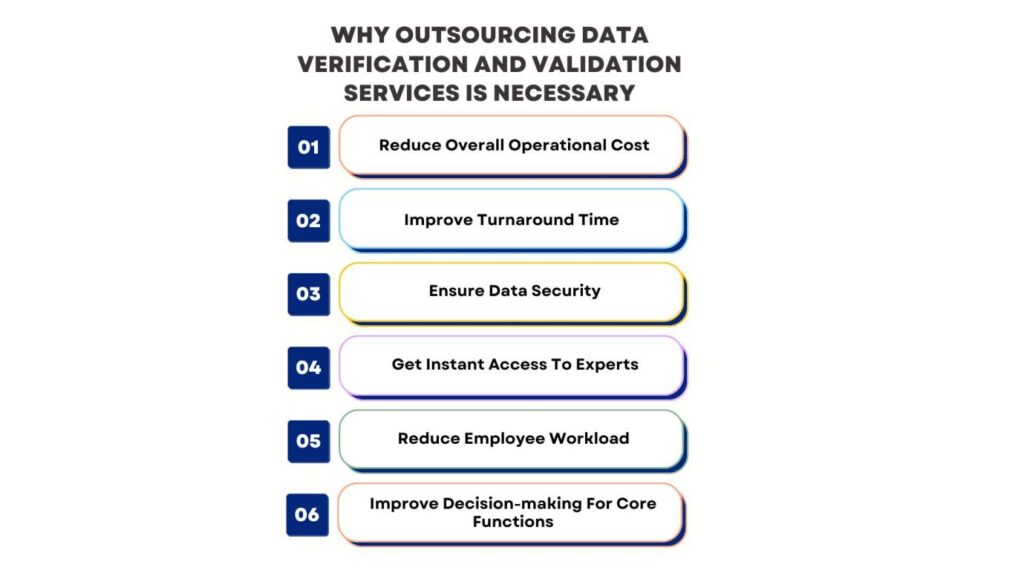Data verification is the process of confirming that data is accurate and complete. It is typically done by comparing the data against a reference or source. For example, a bank may verify a customer’s account balance by comparing the balance on the bank’s records with the balance shown on the customer’s account statement. Data verification services can ensure that the data is accurate and complete and that there are no errors or discrepancies.
Data validation, on the other hand, is the process of ensuring that data is valid and conforms to specific rules or constraints. It is typically done by checking the data against a set of rules, such as data types, range of values, or business rules. For example, a form on a website may validate that a user’s email address is in the correct format (e.g. name@domain.com) and that a password meets certain requirements (e.g. at least 8 characters, one uppercase letter, and one number). Data validation services can ensure that the data is valid and can be used for its intended purpose.
Both data verification and data validation are important for ensuring the integrity and accuracy of data. Data verification helps to ensure that data is accurate and complete, while data validation helps to ensure that data is valid and conforms to specific rules or constraints.
Together, these processes help to ensure that data is reliable and can be used for its intended purpose. Read on to learn more about how they’re done and the benefits they bring, including the ones that come with outsourcing them.
The Methods Involved in Data Verification and Validation
Many tools and techniques are used for data verification and validation. Some common methods include manual checks, automated checks, and statistical methods.
Manual checks involve reviewing data manually to check for errors and inconsistencies. This can be done by comparing data against a reference or source, such as a bank statement, or by reviewing data for patterns or anomalies. Manual checks are often used for small or infrequent data sets but can be time-consuming and prone to human error.
Automated checks involve using software or scripts to check data for errors and inconsistencies. This can be done by comparing data against a reference or source, such as a bank statement, or by checking data against a set of rules or constraints predetermined by the party getting the process done. Automated checks are often used for large or frequent data sets, and can be faster and more accurate than manual checks.
Statistical methods involve using statistical techniques to check data for errors and inconsistencies. This can be done by analyzing data for patterns or anomalies, or by comparing data against a reference or source. Statistical methods can be used for any size or frequency of data set and can be very effective for detecting errors and inconsistencies in data.
Benefits of Data Verification For Businesses
The following are the benefits that data verification offers businesses:
● Enhances Data Accuracy
By verifying data, businesses can confirm that their data is correct and free from errors, which is particularly important for decision-making or providing services to customers. It also helps with better database management.
● Eases Compliance
Data verification helps businesses comply with regulations and laws that require data accuracy and completeness, such as in the healthcare and financial industries.
● Makes Operations Efficient
By ensuring that data is accurate and complete, businesses can avoid wasting time and resources on correcting errors or searching for missing information.
● Eliminates Data Incompleteness
Another benefit of data verification is that it helps to ensure the completeness of data. By confirming that all necessary data is present, businesses can ensure that they have all the information they need to make informed decisions or provide services to customers.
For example, a retail business that does not verify customer information may inadvertently ship orders to the wrong address or send invoices to the wrong email address. By verifying data, businesses can ensure that they have all the necessary information to provide accurate and efficient service to customers.
● Improves Customer Service
Data verification can also help businesses to improve their customer service and satisfaction. By ensuring that data is accurate and complete, businesses can provide more accurate and efficient service to customers. For example, a business that verifies customer information can ensure that orders are shipped to the correct address and that invoices are sent to the correct email address, which can improve customer satisfaction.
Benefits of Data Validation For Businesses
The following are the benefits data validation offers businesses:
● Ensures Data Validity
Data-dependent processes are selective about the kind of data they consume for their purposes. You can only feed a certain type of data for a certain process. With data validation, you can validate if the data you’re feeding a certain process matches the demand.
● Betters Decision-Making
Business decisions are the products of the results of data analysis. If you input valid data, you will make valid decisions that will benefit your business. Otherwise, you could lose what you have and more. Thus, data validation is necessary for gaining accurate data analysis reports that help you make informed decisions for your business.
● Prevents Data Inconsistencies
Similar to data verification, validation can also have a positive effect on the inconsistencies present in your enterprise data. If there are variations in the data type throughout a set, then it will become visible when validation is conducted. This helps keep the data process smooth. Validation also ensures that the range of the data type being validated is within stipulated parameters to maintain consistency.
● Improves Efficiency and Productivity
Invalid data can prove to be a detrimental bottleneck for data-based process pipelines. This is especially the case when that invalid data happens to be in the middle of a valid data sequence being fed to a system or team behind the process.
The net result is a loss of productivity and a reduction in efficiency, sometimes reaching the limits of a complete halt. Such invalid data can be removed by data validation services from a professional, keeping productivity moving unhindered and maintaining efficiency.
● Enhances Customer Service and Satisfaction
Customers expect a valid response to their queries and questions from brands, and you can give them just what they are seeking with data validation. For example, chatbots are increasingly becoming the standard way to interact with customers, and your business’s chatbot should be able to respond to your customers with accurate answers.
Data validation can help you maintain a response database that the chatbot can use. That enhances customer satisfaction with the brand since they won’t be frustrated with invalid answers to their queries.
Why Outsourcing Data Verification and Validation Services Is Necessary

Both data verification and validation are complex, resource-intensive processes that demand much from those performing them. You have two ways to approach this reality: either have them done in-house or via outsourcing. While an in-house team may seem convenient at the outset due to the greater control it gives you, it is ultimately the more unrewarding option.
This is primarily due to the additional responsibilities and costs that you have to bear, particularly the labor costs associated with hiring, training, and maintaining experts who can successfully conduct those functions. Your ROI will take a hit as a result.
In contrast, outsourcing the two processes to a capable agency can get you the following benefits:
- You reduce the overall cost of the project as the external agencies bring economies of scale and currency rate advantages. You also forgo the high labor costs and associated overheads that come with hiring and managing an internal team.
- The turnaround times will be improved as the sheer number of experts coiled with their expertise and equipment can render the processes quickly.
- Your data security will be ensured as such external players work with industry-leading security and privacy measures, including access authorization limits.
- You get instant access to experts and the latest technologies, both of which will help your company keep or gain a market edge.
- The reduced responsibilities on your employees in turn reduce their stress and improve their engagement levels, thereby contributing to improved productivity.
- The lack of a need to manage more particulars leaves you and other top executives with more time to focus on better decision-making on the core functions.
Conclusion
As the value of Big Data increases by the day, companies are left with no choice but to push the envelope on their data management strategy. Along with many others like cleansing and standardization, data verification and validation services should also be opted for by you. It helps turn the tide of your operations both inside and outside the company in numerous ways, benefiting its many aspects multilaterally, providing you with the intelligible and actionable database you need to thrive in an uncertain market.
Author Bio
 Jessica is a Content Strategist, currently engaged at Data-Entry-India.com- a globally renowned data entry and management company -for over five years. She spends most of her time reading and writing about transformative data solutions, helping businesses to tap into their data assets and make the most out of them. So far, she has written over 2000 articles on various data functions, including data entry, data processing, data management, data hygiene, and other related topics. Besides this, she also writes about eCommerce data solutions, helping businesses uncover rich insights and stay afloat amidst the transforming market landscapes.
Jessica is a Content Strategist, currently engaged at Data-Entry-India.com- a globally renowned data entry and management company -for over five years. She spends most of her time reading and writing about transformative data solutions, helping businesses to tap into their data assets and make the most out of them. So far, she has written over 2000 articles on various data functions, including data entry, data processing, data management, data hygiene, and other related topics. Besides this, she also writes about eCommerce data solutions, helping businesses uncover rich insights and stay afloat amidst the transforming market landscapes.








